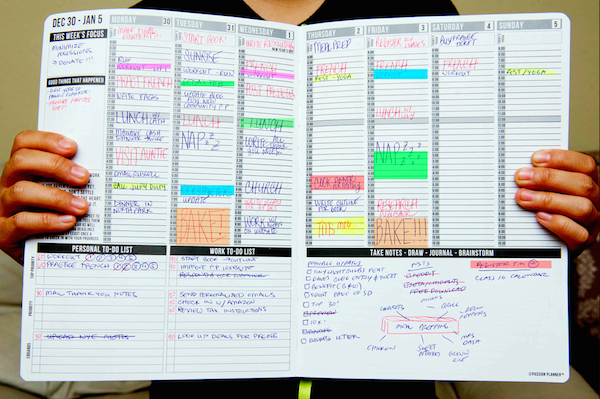 The human brain is an incredible thing. The more we learn about how it works – and how that information can be applied to business – the more amazing it appears. For example, neuromarketing research has proven that our brains are wired to respond better to paper mail than email. That’s just one example of what we are learning as our species tries to adapt to new digital technology.
The human brain is an incredible thing. The more we learn about how it works – and how that information can be applied to business – the more amazing it appears. For example, neuromarketing research has proven that our brains are wired to respond better to paper mail than email. That’s just one example of what we are learning as our species tries to adapt to new digital technology.
And for many, that adaption means going back to what we know works – paper planners.
As Michael Grothaus writes in Fast Company, using paper and pen to record meeting reminders and task notes is a long-held business tradition in Asian — slightly surprising in countries that are assumed to be more technologically advanced.
And the trend seems to be gaining traction in the U.S., Grothaus explains.
“Increasingly, the trend is catching on in the West among younger people,” he writes. “As a matter of fact, some adherents to the pen-and-paper planner culture are so fervent in their use that they post videos giving the world a tour of how they organize in their diaries.”
What’s the appeal? Grothaus interviewed several colleagues who were using the old-school paper planner method, to find out.
“I switched back to my paper-based notebook system after a year of going all-digital,” said Anjali Khosla. “I’m not all-analog now, I still coordinate my appointments through Google Calendar, but I duplicate my appointments in my little notebook.”
Lest you think Khosla is some form of a technical troglodyte, she is, in fact, the editor of Fast Company Digital.
“I prefer my paper system for a number of reasons,” “It gives me a break from staring at screens. It also causes me to stay in the moment and plan my days with intent. I feel satisfaction when I physically check an item off my list.”
It makes sense. As Grothaus notes, and as we’ve reported on previously, writing notes by hand makes it easier to remember. It’s why many educators continue to encourage paper note taking, and why so many college students prefer the old-school method.
Grothaus, eager to understand the appeal, tried it for two weeks. After a few days of making notes in a planner, he found he didn’t need the “ping” from his smartphone to remind him of what was coming next.
“The physical act of flipping back and forth between my planner pages for the week ahead seemed to have an effect on my memory, making it easier to remember the sequence and times of upcoming events,” he notes.
Again, we can thank our brains for that. Granted, it wasn’t perfect for Grothaus, who missed some of the ease with which he could dictate his thoughts and pull up notes and alter them. But he recognized some distinct advantages:
“Indeed, writing notes for a meeting in my paper journal versus typing them out on a touchscreen keyboard made it easier to focus on and extrapolate my thoughts.”
And it creates a beautiful and accessible historical point of reference that exists outside of your laptop or app; indeed it can last for years.
“It becomes not just a preview of our future, but a record of our past. And there’s something refreshing about being able to see just how much you’ve accomplished.”
Maybe it’s time to take another look at how we are organizing our lives.
